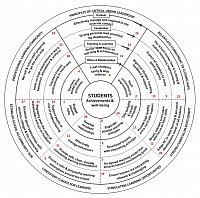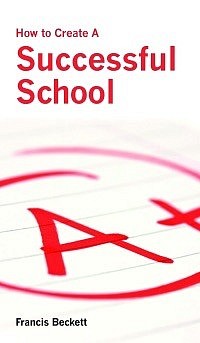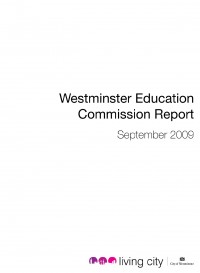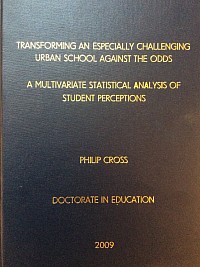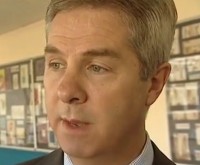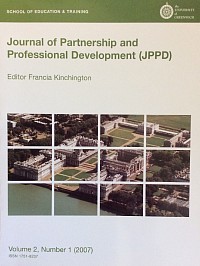Published Work and Articles
Developing a Conceptual School Improvement Model
This paper reports the findings of a four year longitudinal study that identifies the contributory factors that brought about rapid improvement in an especially challenging urban school.
A two-phase sequential mixed-method strategy was used to identify underlying statistically derived factors within a post-positivist paradigm. In phase I, Principle Components Analysis was used to reduce an initial 90-item questionnaire, administered to 302 students, to identify a three factor multilevel school improvement model that comprised 22 sub-factors. The derived primary factors were: i. leadership at the whole school level; ii. teaching and learning in the classroom and iii. the development of students and teachers as part of a unified learning community.
During Phase II, Principle Axis Factoring, Multiple Regression and MANOVA were used to analyse the perceptions of 104 students, gathered via a 22-item questionnaire. This analysis yielded a single coherent school improvement model based on 4 factors (levels) that were interpreted as: context; leadership; learning & teaching and ethos & relationships. In addition, 22 sub-factors were confirmed within the model.
The statistical findings were triangulated with the literature, external documentary evidence about the school and focus group interviews with a stratified random sample of students, parents and teachers. The study has been extended into Phase III to include further testing of the model in the field. This paper proposes a new dynamic multilevel rapid school improvement model based on the research findings.
The Mathematics of Schools
The ‘Missed Potential’
This paper proposes a paradigm shift countering current models of school effectiveness and improvement. Research-based multivariate statistical analysis is presented as part of a more rigorous methodology that challenges OFSTED’s current ‘one size fits all’ approach to taking account of student views about their school. The paper summarises key aspects of the methodological approach used to transform an especially challenging urban school through the eyes of the pupils experiencing the change from within.
How to cite this paper:
Cross, P. (2010). The ‘missed’ potential: Using a multivariate statistical analysis to measure student perceptions of school improvement and school effectiveness in especially challenging urban contexts. Education Review Vol. 22 No. 2, 2010 - Schools and Communities: Responding to New Challenges and Opportunities.
The Head as Campaigner
‘How to Create a Successful School by Francis Beckett (2010) profiles nineteen headteachers with very different views of how to run a school. The first profile in the book details the strategies employed by Phil Cross. This profile was originally published in the Independent on 13 September 2007. The Amazon review of 'How to Create a Successful school' states:
"The crucial element of any successful school is a top class headteacher. An effective, visionary head can bring success out of failure - such is the contention of Francis Beckett's fascinating new book. In it, he looks at the methods of nineteen leading head teachers of primary and secondary schools with a non-selective intake. The profiles he features are nine heads with very different views of how to run a school, united only by the fact that he or she is succeeding against the odds and turning around failing schools in areas of social deprivation - often despite government interference".
Westminster Eucation Commission Report
Transforming an Especially Challenging Urban School Against the Odds
The aim of this four year longitudinal study was to identify the contributory factors that brought about rapid improvement in an especially challenging urban school. A two-phase sequential mixed-method strategy was used to identify underlying statistically
derived factors within a post-positivist paradigm.
Multiple regression, factor analysis and MANOVA were used to derive 4 factors and 22 sub-factors. This thesis then proposes a new dynamic multilevel school improvement model together with a new paradigm for schools operating in challenging urban
contexts.
How to cite this publication:
Cross, P. (2009) Transforming an Especially Challenging Urban School Against the Odds: A Multivariate Statistical Analysis of Student Perceptions. EdD Thesis: Greenwich University.
Improving a Failing School
This 15 minute video was originally made for Teachers TV as part of the series: Just for Governors. It charts key actions taken to move a school from 'Failing' to becoming the second most improved school in the country in four years. The subsequently continued improving to become ‘Outstanding’. The archived TV programme can now be accessed by clicking here or by setting up a teachers media account and then typing 'Improving a Failing School' into the search box.
From Failure to Outstanding: Transforming the English Curriculum in an Especially Challenging Urban School
This paper examines the process of school improvement from the pupils’ perspective of a core curriculum subject, namely, English, identifying the contributory factors that have transformed the subject and had a fundamental impact on the success of the school.
The research reported in this paper uses factor analysis to statistically derive the improvement factors that led to rapid improvement in English. Each factor is then explained in detail.
How to cite this paper:
Cross, P. (2007) From Failure to Outstanding: Transforming the English Curriculum in an Especially Challenging Urban School. The University of Greenwich: Journal of Partnership and Professional Development.
